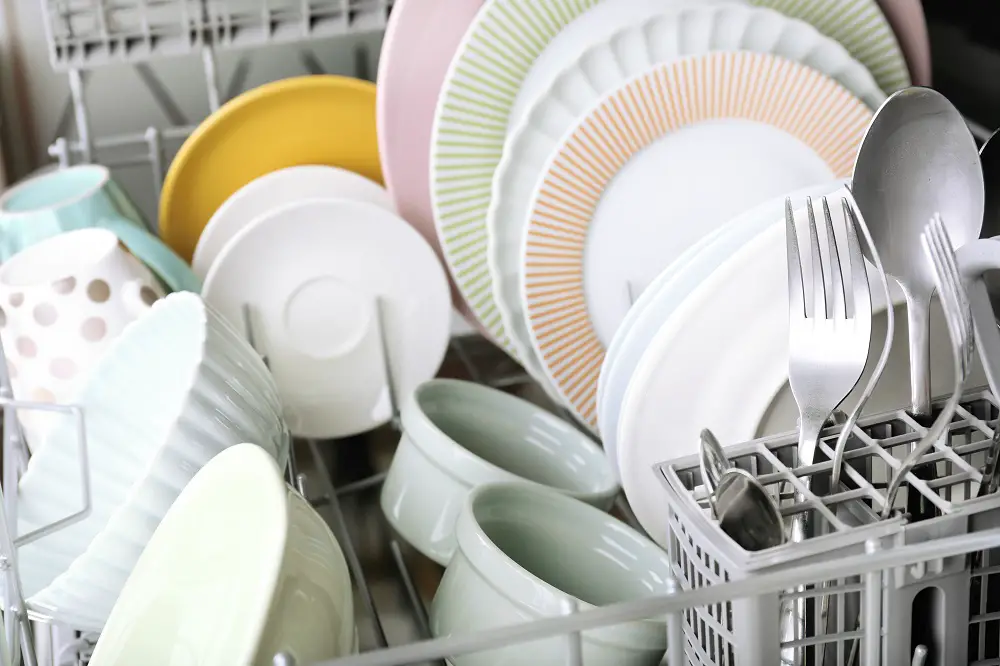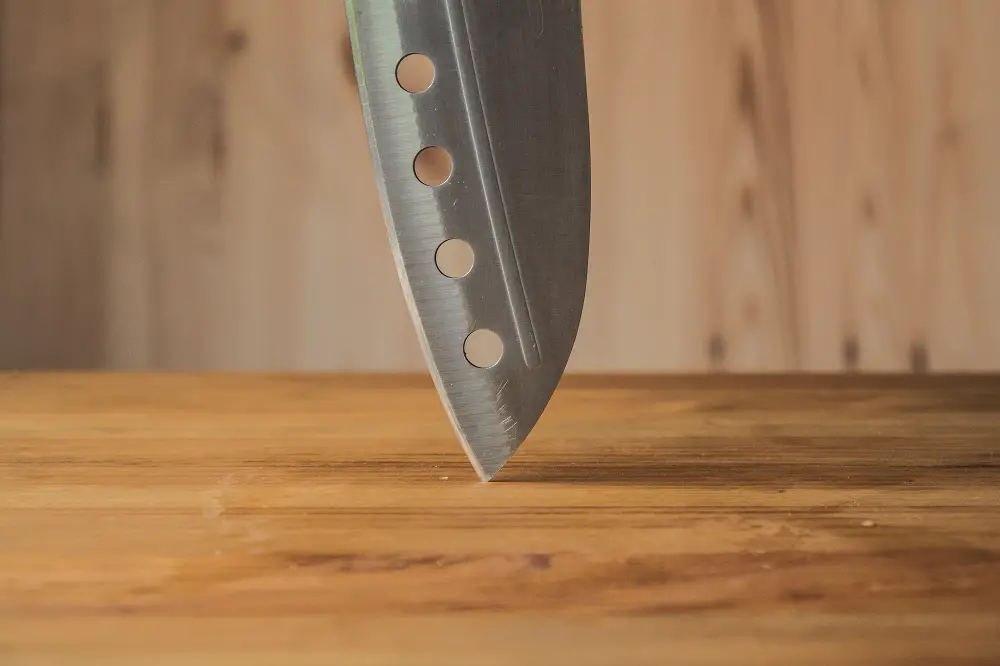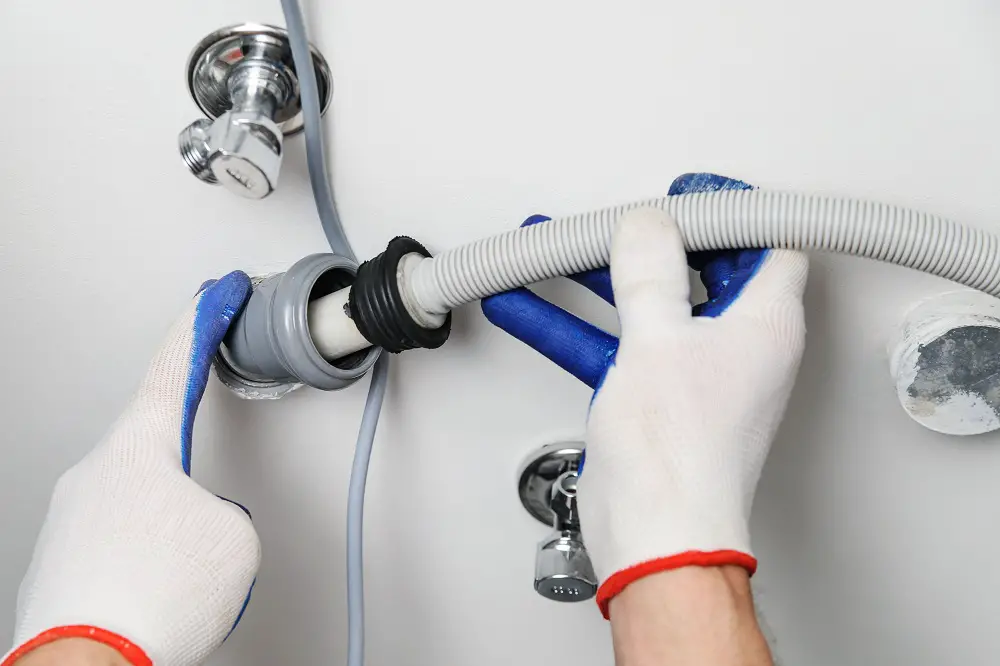Portable dishwashers help clean dirty dishes efficiently while also using much less space. But it can cause trouble and you’ll notice odors from your appliance over time without regular cleaning and maintenance.
Some of the reasons your portable dishwasher smells include a clogged drain, mold/mildew growth, food residue in the dishwasher, a dirty/clogged filter, an improper drain hose setup, or leaving dirty dishes in for a longer time.
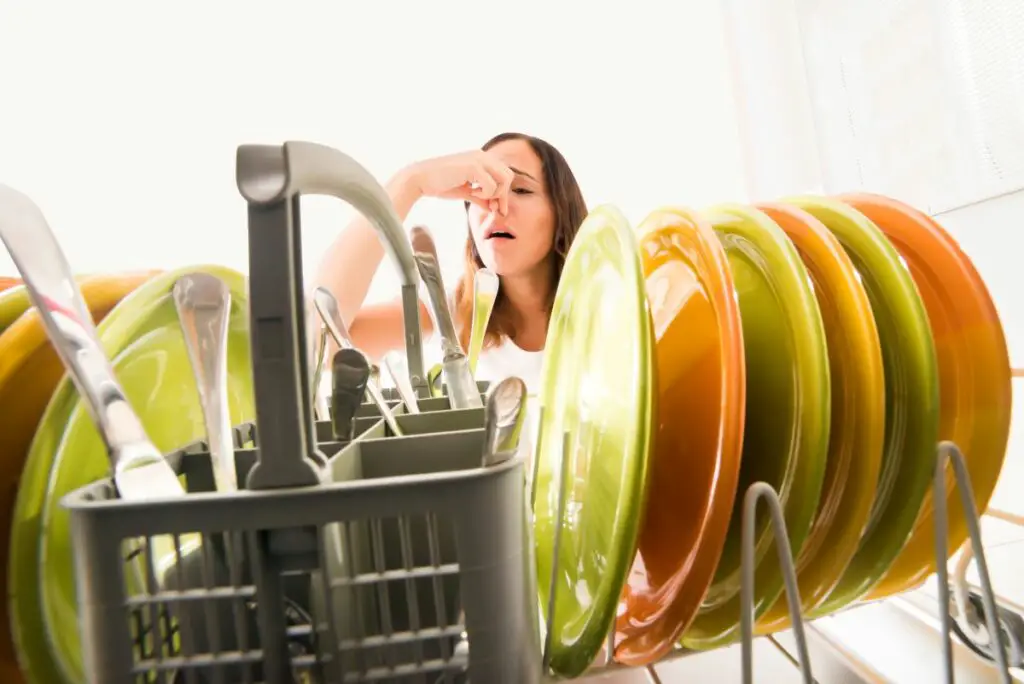
There are a few fixes to help eliminate the foul odors in your appliance. Read on to understand the different causes and how to fix them.
Table of Contents
9 Reasons for a Bad Odor and How To Fix It
A dishwasher that isn’t well maintained can harbor bacteria, mold, mildew, and residual food, leading to undesirable odors. Sometimes, even your dishes may smell odd at the end of a wash cycle.
This is an indication that you’re portable dishwasher needs a deep cleaning to rid of the odors. After that, following the daily, weekly, and monthly cleaning routines for an efficient and durable machine would be best.
You can check that directly here: How to Clean A Portable Dishwasher Drain and in our article How To Clean a Countertop Dishwasher.
Here are some specific reasons your dishwasher smells terrible and the individual fixes.
1. A Dirty/Clogged Filter
The most common cause of dishwasher odor is food particles caught in the dishwasher’s filter or trap. The food trap, often located at the bottom of the tub, catches all residual particles from the cleaning cycle.
While it’s recommended to knock off any remaining food from your dishes before loading them into the dishwasher, there will always be residual grease or food that will lead to a buildup in the filter (if not cleared out regularly).
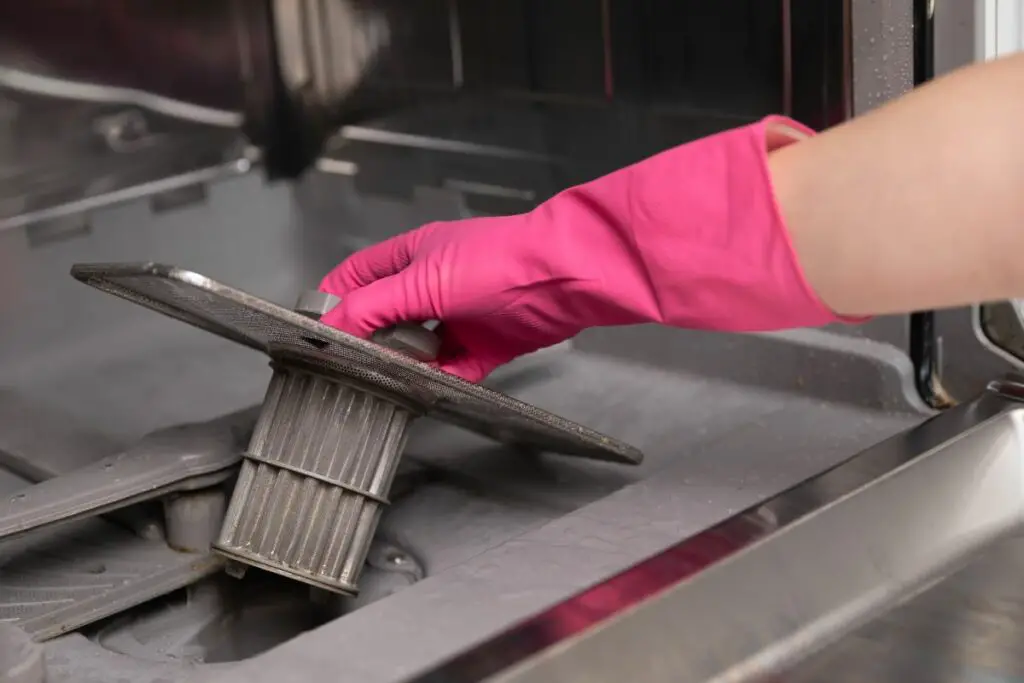
The rotting food causes a stale odor every time you open the appliance.
Moreover, clogged filters can recirculate dirty water and cause your dishwasher not to clean correctly.
Fix a dirty or clogged filter:
Pull out the dish rack (bottom rack for freestanding models) and remove the dishwasher filter.
- Hold the filter under warm running water.
- Use an old toothbrush and warm soapy water to scrub off stubborn residues.
- Rinse it well.
- If the filter is damaged, replace it to avoid any further damage to the internal parts of the dishwasher.
- Clean the drain at the dishwasher’s bottom to remove any residue.
This is important before you place the clean filter back in place.
Techjut tip: Add half a cup of baking soda into the drain to make it extra clean and smell fresh. - Reach into the trap and remove any waste settled at the bottom.
Techjut tip: Use thick rubber gloves to protect your hands. - Consider using a plunger to unclog any accumulated waste in the food trap opening.
Return the dishwasher filter to its place in the tub.
Most importantly, discard food scraps from your dishes before loading them into the dishwasher.
2. Improper Drainage
When your portable dishwasher isn’t draining correctly, it might lead to water remaining at the bottom of your appliance which may cause a bad smell in your dishwasher. Anything more than an inch of standing water is a cause for alarm.
A clog in the drain line causes wastewater to back up and cause an unpleasant smell in your appliance.
Fix Improper Drainage
Inspect the drain hose every week for any clogs or damage.
If there are any clogs, use a hose-cleaning brush or keep it in a warm solution of vinegar and baking soda for about 20 minutes, followed by a thorough hot water rinse.
3. A Damaged Drain Hose
The drain hose empties the dirty water and small food particles into the sink. Any bend, kink, or other such damage to the hose prevents smooth water flow out of the appliance.
This might cause water to remain behind in the portable dishwasher, eventually causing it to smell.
Fix a Damaged Hose
- Straighten the drain hose between the sink and the dishwasher.
- For a drain hose that’s too damaged to straighten out, replace it with a new hose.
4. You’re Accumulating Dirty Dishes
If you’re in the habit of loading your dishwasher over several days to run it only when it’s full, this could be the primary cause of your appliance’s smell.
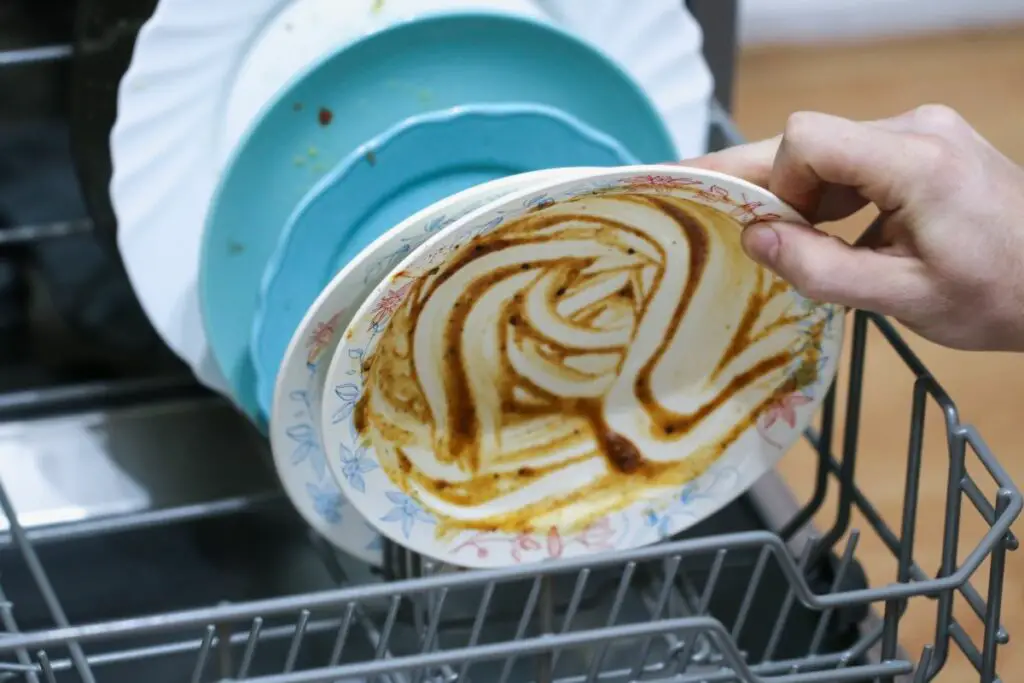
Despite rinsing the dishes before loading them in your dishwasher, tiny particles might remain, causing bacterial growth on the leftover residues and dishes. This bacteria breaks down in a cleaning cycle, producing an unpleasant odor.
Fix the Problem of Accumulated Dirty Dishes
- Run your dishwasher often (at least twice a week).
- Don’t wait for a full load, run the Quick/Light cycle; it uses lesser energy to wash smaller loads.
5. Food Residue Buildup
The food and grease remnants on the dishes can transfer and clog not only the filter but also the hose, spray arms, and other hard-to-reach corners of the appliance’s interior.
This food residue builds up over time and causes your portable dishwasher to smell.
Fix Residue Buildup
- Scrape off large chunks of food and any hard residue from your dishes before loading them into the dishwasher.
Techjut tip: Unless you’re running your dishwasher after loading it over a few days to accumulate a full load, avoid pre-rinsing your dishes too much. The enzyme in the detergent requires dirty dishes to break down and clean. Else, it leaves a chalk-like residue on the dishes.
- Empty the filter after every use; wipe the dishwasher’s interior weekly and perform a deep clean once a month.
6. Mold/Mildew Growth
If you use your dishwasher sparingly and leave it closed for long periods, there are higher chances of mold growth.
Even if you use it regularly, the unpleasant odor could be because the dishwasher couldn’t air out after a wash cycle.
Moist, stale air, if not aired out properly, can also cause a bad smell in your dishwasher.
Another reason for mold and mildew build-up is if the water isn’t draining properly at the end of a cycle, and there’s leftover water on the bottom of the dishwasher tub.
Moisture trapped around the door gasket can also cause mold/mildew growth, especially on the gasket seal.
Fix the Growth of Mold and Mildew
- Use your dishwasher more often.
- Leave the dishwasher door open sufficiently to let it air and dry out between uses.
- Give your dishwasher a good scrub inside-out without skipping the gasket. Wipe dry after you’re done scrubbing.
7. A Poorly Placed Drain Hose
The drain hose placement is essential for proper wastewater disposal from the machine into the sink.
A hose that’s not kinked or clogged can still cause your dishwasher to smell because of its placement, especially if you extend your portable dishwasher hose for convenience.
If the drain hose runs from the back of your portable dishwasher, along the floor, or bent downwards, and moves up towards the sink, gravity could be working against proper draining.
This leads to water remaining on the dishwasher tub’s floor, causing an odor.
Fix a Poorly Placed Drain Hose
If a straight placement of the drain hose from the appliance to the sink isn’t possible, try a high loop (like built-in dishwashers use to prevent backflow of wastewater).
Keep the drain hose with minimal bends (especially the low loops) for easier draining.
8. Hard Water Supply
When the main supply to the dishwasher is hard water, not only will your dishes not be washed properly, but it will also cause your appliance to smell over time.
This will be even more of a problem if you use a countertop dishwasher with a built-in water tank that you must fill manually. If left for too long, calcium and mineral deposits will build up in the water tank and the dishwasher’s tub, the filter, and the spray arms.
While the smell might be subtle, it’s still different from the fresh dishwasher smell you’d expect.
Fixes to Soften the Water
- Install a water softener system for the main water supply.
- Use water-softening agents in the dishwasher for each load.
- Run an empty cycle with a bowl of vinegar placed in the dishwasher to remove hard water stains and residue.
- Sprinkle baking soda on the floor of the dishwasher and leave it overnight.
Run an empty cycle in the morning; it usually helps neutralize any remaining odors.
9. Using the Wrong Type and Amount of Detergent
Modern dishwashers are designed to use minimal water for their wash cycles and require high-efficiency detergent. Using any other type of detergent might result in dishes remaining dirty or having soapy residue on them after the wash cycle.
Moreover, using more detergent than recommended will result in excessive soapy suds that might not be rinsed thoroughly. This causes the soapy residue to remain in the dishwasher’s interior, resulting in foul odors over time.
Techjut tip: If you have a countertop dishwasher, avoid using readily available detergent pods (meant for standard dishwashers) since countertops have a reduced load capacity and require much less detergent for a wash cycle.
Fix A Wrong Detergent Choice
Use the right detergent type and amount, as per the manufacturer’s recommendations.
Refer to the instruction manual or check the manufacturer’s website for recommended detergent use.
When To Replace Your Smelling Portable Dishwasher?
In some cases, it is best to buy a new dishwasher.
Despite all your efforts and fixes, if your portable dishwasher still smells, you can always get professional help.
However, if that doesn’t resolve it, you must replace your smelling appliance.
Additionally, if your portable dishwasher is over seven years old and you’re unable to rid of the undesirable odor, the best option is to replace it.
The new, modern portable dishwasher models have several features (including a self-clean function) and can clean dishes just as well as a built-in model.
You should read our article about how long portable dishwashers last to get a better understanding of their lifespan and durability.
Consider getting a portable dishwasher with a stainless steel interior for an increased lifespan.
Conclusion
While a deep clean might seem like a good, all-around fix to get rid of that bad smell in your portable dishwasher, it helps to identify the exact cause instead and fix it.
The different reasons your dishwasher smells include a clogged filter, improper drainage, a damaged drain hose, accumulation of dirty dishes and infrequent use, food residue buildup, mold/mildew, poor drain hose alignment, hard water, and improper detergent use.
And, in the worst case, it might be best to replace your smelling portable dishwasher with a new one if nothing you do seems to fix the odor.
Remember, regular cleaning and maintenance are vital to keeping a dishwasher – old or new, in good shape and efficient for longer.
